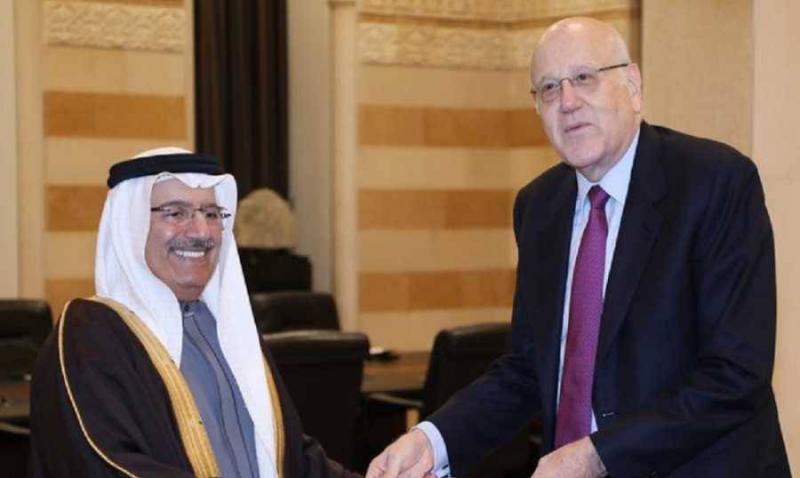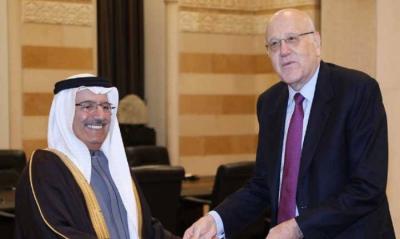For the third consecutive year, Lebanon will participate in the Arab Summit through Prime Minister Najib Mikati, amid the presidential vacancy and the absence of any indications to resolve the presidential crisis for internal and external reasons, before the summit scheduled for May 2024, according to "Asharq Al-Awsat." Mikati received an invitation from King of Bahrain Hamad bin Isa Al Khalifa through the Bahraini envoy and ambassador to Syria, Waheed Mubarak Sayyar, to participate in the 33rd regular session of the Arab League Council at the summit level, scheduled for Thursday, May 16, 2024. The King of Bahrain expressed in his message the desire to enhance the course of joint Arab action and to serve the interests of the Arab nation, emphasizing that your personal participation in the works of this important summit will have significant impact and importance given the difficult conditions and grave challenges facing our Arab homeland at present, which will provide a bright vision and sound opinions to continue together to serve our Arab nation's issues and achieve the aspirations of all its peoples toward security, stability, and prosperity.
This will be Mikati’s fourth participation in the Arab Summit at the head of a ministerial delegation since the presidential vacancy began at the end of October 2022, coinciding with the 31st Arab Summit held in Algeria in November 2022, which was postponed for two consecutive years due to the coronavirus pandemic, just a few days after the end of President Michel Aoun's term. In 2023, Mikati also led a ministerial delegation at the Arab Summit held in May in Jeddah, where he spoke about the crises facing Lebanon, primarily the vacuum in the presidency, and the overwhelming refugee crisis that surpasses the country's capacity, stressing that the return of refugees cannot be realized without joint Arab efforts and dialogue with Syria, calling for projects to revive the devastated areas in Syria and establishing a roadmap for the return of refugees.
While the Lebanese were counting on the outcomes of the Arab Summit to push towards ending the presidential crisis, the final statement merely urged the Lebanese authorities to continue their efforts to elect a president and form a government as soon as possible, in order to preserve the functioning of constitutional institutions, stability, and the necessity of conducting structural economic reforms to exit the economic crisis.
About a year after the presidential vacancy and the failure of all efforts made in this regard, and after sessions for election that ended without results, Mikati participated in the extraordinary Arab Summit to discuss the Israeli aggression on the Gaza Strip and developments in the occupied Palestinian territories, as well as the Arab-African summit held in Riyadh in November 2023. He headed an expanded ministerial delegation from various sects, including: Foreign Minister Abdullah Bou Habib, Minister of Industry George Bouchikian, Minister of Economy Amin Salam, Minister of Tourism Walid Nassar, and Minister of Agriculture Abbas Al-Haj Hassan.
Mikati renewed Lebanon’s commitment to international legitimacy, particularly Resolution 1701, emphasizing the necessity of pressuring Israel to implement all its provisions and obliging it to cease its provocations and aggression against our homeland. He confirmed that Lebanon's choice has always been and remains peace, and that our culture is one of peace based on rights, justice, international law, and international legitimacy decisions.
Last September, Mikati also represented Lebanon in the United Nations General Assembly, which the President is also expected to attend. In his address, he highlighted that the first challenge facing Lebanon lies in the presidential vacancy and the inability to elect a new president, resulting in institutional and political instability, exacerbation of the economic and financial crisis, and difficulties in launching reform and recovery plans. The issue of displacement also received a portion of his speech, where he pointed out that the Syrian displacement represents the second challenge for Lebanon, which is burdened by successive waves of displacement, impacting all aspects of life.
Mikati also participated in the first Arab-Chinese summit held last December in the Saudi capital under the chairmanship of Crown Prince Mohammed bin Salman, with the presence of the Chinese president, and the wide participation of Arab leaders and officials, followed by COP 28 climate change conference in Dubai.
Mikati’s representation of Lebanon in Arab and international forums stems from the constitution, which stipulates that the powers of the president are transferred to the government in the event of a presidential vacancy. This is clarified by constitutional legal expert Said Malik, who notes that the absence of a president and the lack of an elected president inflicts significant harm and damage on Lebanon, particularly regarding its image and representation. He told "Asharq Al-Awsat": Lebanon should represent itself through its president in the upcoming Arab Summit and similar summits, but in the absence of the presidency, the prime minister represents the state in accordance with Article 62, which states that when the presidency is vacant, the government or council of ministers exercises the powers of the president until a new president is elected.
He affirms, on the other hand, that it is unacceptable for the prime minister to represent Lebanon personally; if he represents the cabinet on behalf of the president, that would be acceptable according to constitutional provisions, but it does not negate the necessity of electing a president soon, especially given the significant consequences of prolonging the vacancy.
This comes amid a Lebanese division regarding the work of the caretaker government, which some consider to be overstepping its mandates in light of the presidential vacancy, with its head Najib Mikati facing widespread criticism, particularly from some Christian factions and Maronite Patriarch Bechir Al-Rai. The latest of these criticisms came from the Free Patriotic Movement, whose head, deputy Gibran Bassil, has been continuously attacking Mikati and the government's decisions, having decided to boycott ministers affiliated with him in government sessions since the beginning of the presidential vacancy. Following the recent political committee meeting, the movement stated in a communiqué that it is not a bystander to the ongoing constitutional violations by a government that lacks constitutional legitimacy, with serious implications for the future of partnership among the Lebanese. The movement is also striving to stop the ongoing constitutional massacre but is not receiving sufficient support from the concerned political forces.




